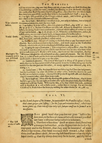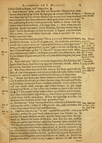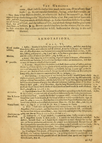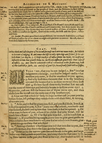In this second chapter of his Sermon, he controlleth the Pharisees justice (that is, their alms, prayer, and fasting) for the scope and intention thereof, which was vain-glory. (19) Their end also was to be rich, but ours must not be so much as in necessaries.
TAKE good heed that you do not your • justice before men, to be seen of them; otherwise reward you shall not have with your father which is in heaven.
2Therefore when thou [a] doest an alms-deed, sound not a trumpet before thee, as the Hypocrites do in the Synagogues and in the streets, that they may be honoured of men; Amen I say to you, they have received their reward. 3But when thou doest an alms-deed, let not thy left hand know what thy right hand doeth; 4that thy alms-deed may be in secret, and thy father which seeth in secret, will • repay thee.
5And when ye [b] pray, you shall not be as the • Hypocrites, that love to stand and pray in the Synagogues and corners of the streets, that they may be seen of men; Amen I say to you, they have received their reward. 6But thou when thou shalt pray, enter into thy chamber, and having shut the door, pray to thy father in secret; and thy father which seeth in secret, will repay thee. 7And when you are praying, speak not much, as the Heathen. For they think that in their • much-speaking they may be heard. 8Be not you therefore like to them, for your father knoweth what is needful for you, before you ask him.
9Thus therefore shall you pray. * Our father which art in heaven, sanctified be thy name. 10Let thy Kingdom come. Thy will be done, as in heaven, in earth also. 11Give us today our [c] supersubstantial bread. 12And forgive us our • debts, as we also forgive our debtors. 13And • lead us not into tentation. But deliver us from evil. Amen. 14For • if you will * forgive men their offences, your heavenly father will forgive you also your offences. 15But if you will not forgive men, neither will your father forgive you your offences.
16And when you • [d] fast, be not as the hypocrites, sad. For they disfigure their faces, that they may appear unto men to fast. Amen I say to you, that they have received their reward.
17But thou when thou doest fast, anoint thy head, and wash thy face; 18that thou appear not to men to fast, but to thy father which is in secret; and thy father which seeth in secret, will repay thee.
19Heap * not up to yourselves • treasures on the earth; where the rust and moth do corrupt, and where thieves dig through and steal. 20But heap up to yourselves treasures in heaven; where neither the rust nor moth doth corrupt, and where thieves do not dig through nor steal. 21For where thy treasure is, there is thy heart also. 22The * candle of thy body is thine eye. If thine eye be simple, thy whole body shall be lightsome. 23But if thine eye be nought; thy whole body shall be darksome. If then the light that is in thee, be darkness; the darkness itself how great shall it be?
24No man can * serve • two masters. For either he will hate the one, and love the other; or he will sustain the one, and contemn the other. You cannot serve God and Mammon.
25Therefore I say to you, * be not • careful for your life, what you shall eat, neither for your body what raiment you shall put on. Is not the life more than the meat; and the body more than the raiment? 26Behold the fowls of the air, that they sow not, neither reap, nor gather into barns; and your heavenly father feedeth them. Are not you much more of price than they? 27And which of you by caring, can add to his stature one cubit? 28And for raiment why are you careful? Consider the lilies of the field how they grow; they labour not, neither do they spin. 29But I say to you, that neither Salomon in all his glory was arrayed as one of these. 30And if the grass of the field, which today is, and tomorrow is cast into the oven, God doth so clothe; how much more you, O ye of very small faith? 31Be not careful therefore, saying, what shall we eat, or what shall we drink, or wherewith shall we be covered? 32for all these things the [e] Heathen do seek after. For your father knoweth that you need all these things. 33Seek therefore first the Kingdom of God, and the justice of him, and all these things shall be given you besides. 34Be not careful therefore for the morrow; for the morrow day will be careful for itself. Sufficient for the day is the evil thereof.
Footnotes
- ↑ The first work of justice.
- ↑ The second work of justice.
- ↑ In St. Luke, the Latin is Panem quotidianum, daily bread, the Greek being indifferent to both. τὸν ἐπιούσιον
- ↑ The third work of justice.
- ↑ They seek temporal things only, and that not of the true God, but of their Idols, or by their own industry.
ANNOTATIONS. CHAP. VI.
↑ 1. Justice.) Hereby it is plain that good works be justice, and that man doing them doth justice, and is thereby just and justified, and not by faith only. All which justice of a Christian man, our Saviour here compriseth in these three works, in Alms, fasting, and prayers, Aug. li. perf. just. ch. 8. So that to give alms, is to do justice, and the works of mercy are justice, Aug. in Psal. 49 v. 5.
↑ 4. Repay.) This repaying and rewarding of good works in heaven, often mentioned here by our Saviour, declareth that the said works are meritorious, and that we may do them in respect of that reward.
↑ 5. Hypocrites.) Hypocrisy is forbidden in all these three works of justice, and not the doing of them openly to the glory of God, and the profit of our neighbour, and our own salvation: for Christ before (ch. 5.) biddeth, saying: Let your light so shine before men etc. And in all such works S. Gregorie’s rule is to be followed, The work so to be in public, that the intention remain in secret. Ho. 11 in Evang. ch. 10.
↑ 7. Much speaking.) Long prayer is not forbid, for Christ * himself spent whole nights in prayer; and he saith, * we must pray always; and * the Apostle exhorteth to pray without intermission; and the holy Church * from the beginning hath had her Canonical hours of prayer: but idle and voluntary babbling, either of the Heathens to their gods, or of Heretiks, that by long Rhetorical prayers think to persuade God: whereas the Collects of the Church are most brief and most effectual. See S. Augustine ep. 121, ch. 8, 9, 10.
↑ 11. Supersubstantial bread.) By this bread so called here according to the Latin word and the Greek, we ask not only all necessary sustenance for the body, but much more all spiritual food, namely the blessed Sacrament itself, which is Christ the true bread that came from Heaven, and the bread of life to us that eat his body, Cypr. de orat. Do. Aug. ep. 121 ch. 11. And therefore it is called here Supersubstantial, that is, the bread that passeth and excelleth all creatures, Hiero. in. 2 Tit. In 6 Mat. Amb. lib. 5 de Sacr. ch. 4. Aug. ser. 18 de Verb. Do. sec. Mat. S. Germanus in Theoria.
↑ 12. Debts.) These debts do signify not only mortal sins, but also venial, as St. Augustine often teacheth: and therefore every man, be he never so just, yet because he can not live without venial sins, may very truly and ought to say this prayer, Aug. cont. duas. ep. Pelag. lib. 1 ch. 14 lib. 21 de Civit. ch. 27.
↑ 13. Lead us not.) St. Cypr. readeth, Ne patiaris nos induci. Suffer us not to be led, as St. Augustine noteth, lib. de bo. persev. ch. 6, and so the holy Church understandeth it, because God (as St. James saith) tempteth no man: though for our sins, or for our probation and crown, he permit us to be tempted. Beware then of Beza’s exposition upon this place, who (according to the Calvinist’s opinion) saith, that God leadeth them into tentation, into whom himself bringeth in Satan for to fill their hearts: so making God the author of sin.
↑ 14. If you forgive.) This point, of forgiving our Brother, when we ask forgiveness of God, our Saviour repeateth again, as a thing much to be considered: and therefore commended in the parable also of the servant that would not forgive his fellow servant, Mat. 18.
↑ 16. Fast.) He forbiddeth not open and public fasts, which in the * Scriptures were commanded and proclaimed to the people of God; and the Ninivites by such fasting appeased God’s wrath: but to fast for vain-glory and praise of men, and to be desirous by the very face and look to be taken for a faster, that is forbidden, and that is hypocrisy.
↑ 20. Treasures in Heaven.) Treasures laid up in Heaven, must needs signify, not faith only, but plentiful alms, and deeds of mercy and other good works, which God keeping, as in a book, will reward them accordingly: as of the contrary the Apostle saith: He that soweth sparingly, shall reap sparingly. 2. Cor. 9.
↑ 24. Two Masters.) Two religions, God and Baal, Christ and Calvin, Mass and Communion, the Catholik Church and Heretical Conventicles. Let them mark this lesson of our Saviour, that think they may serve all masters, all times, all religions. Again, these two masters do signify, God and the world, the flesh and the spirit, justice and sin.
↑ 25. Careful.) Prudent provision is not prohibited, but too much doubtfulness and fear of God’s provision for us: to whom we ought with patience to commit the rest, when we have done sufficiently for our part.
Margin Notes
- 9. The Pater Noster
- 16–21. The Ghospel upon Ash Wednesday.
- 24–33. The Ghospel on the 14th Sunday after Pentecost.
- annot. 1. Good works justify.
- annot. 1. Merits.
- annot. 5. Hypocrisy
- annot. 11. τον επιουσιον
- annot. 11. The Bl. Sacrament.
- annot. 12. Venial sins.
- annot. 13. God is not author of evil.
- annot. 16. Public fast.
- annot. 20. Meritorious works.
Margin References
- 9. Luc. 11, 2.
- 14. Mar. 11, 25.
- 19. Luc. 12, 33.
- 22. Luc. 11, 34.
- 24.Luc. 16, 13.
- 25. Luc. 12, 22.
- annot. 7. Luc. 6, 12. 18, 1. 21, 36. 1 Thes. 5, 17. Cypr. de orat. Do. in fine.
- annot. 13. In Expos. orat. Do. Jac. 1.
- annot. 16. Jud 20, 26. 2 Esd. 9. Joel 2, 15. Jon. 3.




